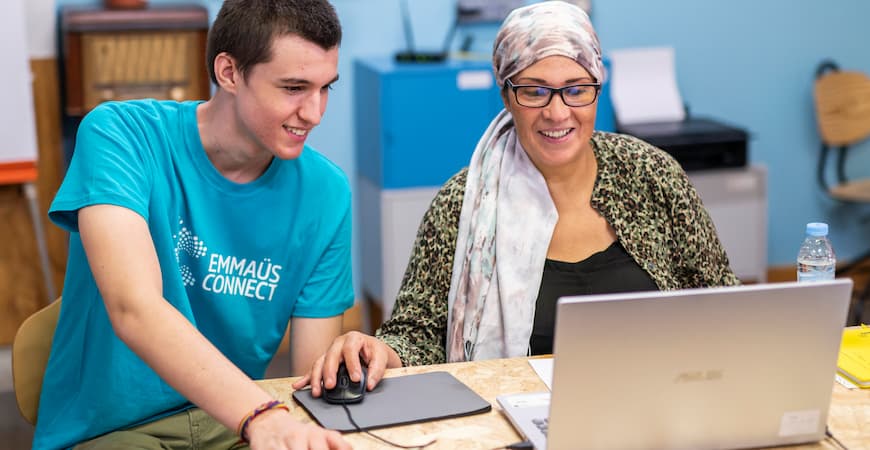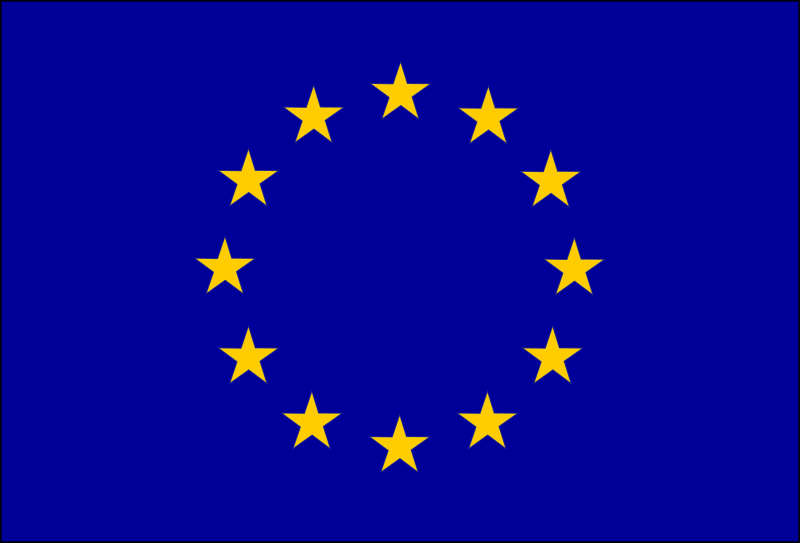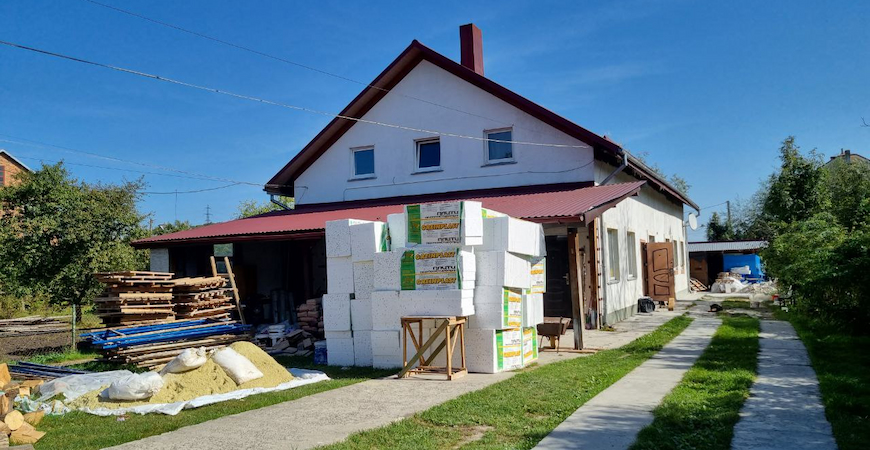Marie Tixier
Tackling digital exclusion
Further afield in Europe with Emmaus Connect
Emmaus Connect is a French group created in 2013, which promotes digital inclusion for people experiencing social and digital exclusion. We met up with Lilan Criscuolo, who is in charge of international partnerships, to hear what she has to say about future plans for Europe.
After expanding rapidly in France (where the organisation is active in 18 areas, has 12 drop-in centres and has helped more than 137,000 people), in 2023 Emmaus Connect decided to explore the possibility of developing this type of activity in Europe, in partnership with Emmaus groups wherever possible.
Lilan, can you tell us how the idea of extending this project to other countries came about, and what steps have been taken?
Over the last ten years, Emmaus Connect has developed expertise in digital inclusion, focusing primarily on the situation in France. Yet given the major challenges in Europe (42% of citizens lack basic digital skills, even though they are essential in over 90% of jobs), we wanted to explore the issue of digital exclusion in other countries.
Moreover, one of the key missions of Emmaus Connect is to help social work services meet the challenges of digital inclusion – in France, we have trained 13,000 social workers and equipped 500 social welfare facilities. We decided to pursue this approach as part of a Europe-wide project.
This is how our partnership project got off the ground at a European level. The aim was to improve our knowledge of the challenges in other countries affected by the digital divide, while meeting actors and drawing inspiration from good practices, along with sharing our experiences.
In 2023, we launched a training project for social workers, with support from the Erasmus+ programme, in collaboration with Emmaus Satu Mare in Romania and Liberittutti, a social cooperative in Italy.
What are the results of this project?
In 2023, our three organisations worked together to reach several objectives. A field study was conducted on the obstacles to using digital technology in Romania and Italy, both for people experiencing exclusion and social welfare organisations. As a result, each partner was able to better understand the specific challenges in their own country, identify local initiatives and even extend their network of partners to facilitate the inclusion of the target groups.
New professional training modules were developed by Emmaus Connect and were successfully tested by 19 social workers in Turin (Italy) and Satu Mare (Romania). These professionals were informed about the challenges of digital poverty, trained on how to adapt teaching resources and taught the basics of designing workshops.
Having achieved our training objective of the social initiative, we are now focusing on sharing the results of the project, in the hope that they will benefit other non-profit organisations and social welfare services, in order to improve digital support for the most vulnerable members of society.
So, what’s next?
Through this project, various social and environmental issues linked to digital technology have been identified, paving the way for new initiatives.
A number of possible projects have emerged: continuing to train social workers to support people experiencing exclusion, facilitating access to high quality educational content and pedagogical resources, bolstering access to digital hardware through the collection and re-use of equipment, and even tackling tomorrow’s digital inclusion issues, such as digital citizenship.
On the strength of this initial experience, we would like to respond to these challenges together with other Emmaus groups, to facilitate the sharing of expertise and exchanges of good practices, while taking action on a large enough scale to help bridge the digital divide across Europe.
For further information, visit https://emmaus-connect.org/

© Emmaus Connect
2024 European Elections
The European elections are fast approaching. All citizens of the European Union will be able to vote over the period of 6-9 June 2024 to elect the MEPs who will represent them in the European Parliament for the next five years. In other words, a large number of you are going to elect the men and women who will have the power to decide what Europe will look like in the next few years.
Europe – a vital decision-making level for Emmaus’ work
European policy plays a pivotal role in the daily lives of each of us, directly influencing aspects such as labour rights, efforts to address precarity, health, production and environmental issues. For example, European law governs workers’ rights across Europe and migration policy, and directly affects our collection, sorting, reuse and recycling work, which are fundamental aspects of the Emmaus groups’ efforts.
The extreme right: a threat to Emmaus’ work in Europe
However, a major concern is emerging about the possible rise of extreme right-wing political parties, representing a serious threat to organisations such as Emmaus, particularly with regard to unconditional shelter and support. It is crucial that we resolutely resist the influence of political parties that embody racism and xenophobia.
Taking action together
It is vital that the future MEPs understand the urgent need to stand shoulder to shoulder with the most deprived people, go further on climate issues, and support the work of our groups. To raise the awareness of these MEPs, Emmaus Europe is suggesting that you invite prospective MEPs to visit your groups. This will provide a unique opportunity to showcase your everyday work to them and stress the issues that you face. If elected, these people could be Emmaus allies and help us to address exclusion and work for solidarity at the European level.
Emmaus Europe pledges to support you in this initiative by contacting the prospective MEPs and suggesting a visit to our groups. We are also encouraging you to contact the prospective MEPs in your countries, who you know, to arrange meetings. We are offering you the following help with this initiative:
- An invitation template that you can personalise and send to the prospective MEPs of your choice. Most of the parties have designated their lists and these can be found on their websites. Their diaries fill up fast, so we advise you to contact them as soon as possible.
- Documents detailing Emmaus Europe’s proposals for these elections.
General proposals – short version
Detailed proposals – long version
- We can also help you to set up specific initiatives if you so wish, or to prepare members of your group to speak up in order to champion your proposals and lived experience to the prospective MEPs.
We are available if you have any questions and to support you with this initiative.
Contact: manon.gaham@emmaus-europe.org & eve.poulteau@emmaus-europe.org

Three European projects supported by the Abbé Pierre Foundation!
Every year Emmaus Europe works with Emmaus International to present projects put forward by the groups in Europe (excluding France) to the Abbé Pierre Foundation. The projects must be focused on the topic of improving housing conditions.
This year 3 of the 8 international projects that were chosen to be given support by the Foundation are European projects!
IFS-Emmaus – Bosnia-Herzegovina
The group will receive support in order to build housing for two single-parent families that have suffered from domestic violence. Social services put the group in touch with these families.
Emmaus Oxford – UK
The group will receive support in order to build 10 bathrooms. This amount will be part of a renovation project for two adjoined houses with the goal of providing dignified housing for 10 companions in an autonomous setting – a final step of sorts in their transition towards leaving the community.
Emmaus Oselya – Ukraine
The last project selected for support will benefit from funding by both the Abbé Pierre Foundation and Emmaus Europe: due to the Covid-19 pandemic and then the war led by Russia, this Ukrainian group has doubled the number of people it hosts over the last 3 years. And it has done so in an emergency context. This welcome has been provided thanks to the selfless commitment of all of the members of the community and by transforming certain shared spaces into new bedrooms.
Thanks to joint funding from Emmaus Europe and from the Abbé Pierre Foundation and by using some of its own funds, the group has now been able to start the building works: renovating an old workshop and transforming rooms into bedrooms. This project will provide a more dignified welcome to the companions and will help replace the shared spaces that have been transformed into bedrooms over the last few years. The building work should be finished before winter hits!

Emmaus Oselya’s old workshop is going to be transformed into a community house. © Emmaus Oselya



